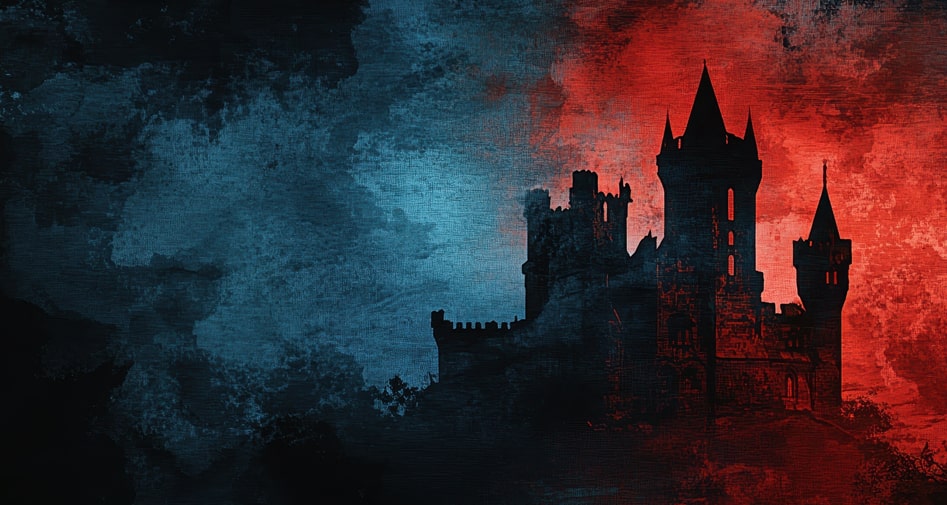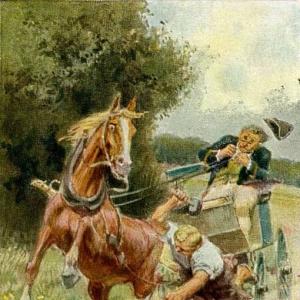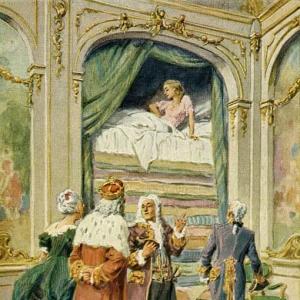Reading time: 9 min
Attention: This is a scary story.
Three army-surgeons who thought they knew their art perfectly, were travelling about the world, and they came to an inn where they wanted to pass the night. The host asked whence they came, and whither they were going? „We are roaming about the world and practising our art.“ – „Just show me for once in a way what you can do,“ said the host. Then the first said he would cut off his hand, and put it on again early next morning. The second said he would tear out his heart, and replace it next morning. The third said he would cut out his eyes and heal them again next morning. „If you can do that,“ said the innkeeper, „you have learnt everything.“ They, however, had a salve, with which they rubbed themselves, which joined parts together, and they carried the little bottle in which it was, constantly with them. Then they cut the hand, heart and eyes from their bodies as they had said they would, and laid them all together on a plate, and gave it to the innkeeper. The innkeeper gave it to a servant who was to set it in the cupboard, and take good care of it. The girl, however, had a lover in secret, who was a soldier. When therefore the innkeeper, the three army-surgeons, and everyone else in the house were asleep, the soldier came and wanted something to eat. The girl opened the cupboard and brought him some food, and in her love forgot to shut the cupboard-door again; She seated herself at the table by her lover, and they chattered away together. While she sat so contentedly there, thinking of no ill luck, the cat came creeping in, found the cupboard open, took the hand and heart and eyes of the three army-surgeons, and ran off with them. When the soldier had done eating, and the girl was taking away the things and going to shut the cupboard she saw that the plate which the innkeeper had given her to take care of, was empty. Then she said in a fright to her lover, „Ah, miserable girl, what shall I do? The hand is gone, the heart and the eyes are gone too, what will become of me in the morning?“ – „Be easy,“ said he, „I will help thee out of thy trouble there is a thief hanging outside on the gallows, I will cut off his hand. Which hand was it?“ – „The right one.“ Then the girl gave him a sharp knife, and he went and cut the poor sinner’s right hand off, and brought it to her. After this he caught the cat and cut its eyes out, and now nothing but the heart was wanting. „Have you not been killing, and are not the dead pigs in the cellar?“ said he. „Yes,“ said the girl. „That’s well,“ said the soldier, and he went down and fetched a pig’s heart. The girl placed all together on the plate, and put it in the cupboard, and when after this her lover took leave of her, she went quietly to bed. In the morning when the three army-surgeons got up, they told the girl she was to bring them the plate on which the hand, heart, and eyes were lying. Then she brought it out of the cupboard, and the first fixed the thief’s hand on and smeared it with his salve, and it grew to his arm directly. The second took the cat’s eyes and put them in his own head. The third fixed the pig’s heart firm in the place where his own had been, and the innkeeper stood by, admired their skill, and said he had never yet seen such a thing as that done, and would sing their praises and recommend them to everyone. Then they paid their bill, and travelled farther.
As they were on their way, the one with the pig’s heart did not stay with them at all, but wherever there was a corner he ran to it, and rooted about in it with his nose as pigs do. The others wanted to hold him back by the tail of his coat, but that did no good. He tore himself loose, and ran wherever the dirt was thickest. The second also behaved very strangely. He rubbed his eyes, and said to the others, „Comrades, what is the matter? I don’t see at all. Will one of you lead me, so that I do not fall.“ Then with difficulty they travelled on till evening, when they reached another inn. They went into the bar together, and there at a table in the corner sat a rich man counting money. The one with the thief’s hand walked round about him, made a sudden movement twice with his arm, and at last when the stranger turned away, he snatched at the pile of money, and took a handful from it. One of them saw this, and said, „Comrade, what art thou about? Thou must not steal shame on thee!“ – „Eh,“ said he, „but how can I stop myself? My hand twitches, and I am forced to snatch things whether I will or not.“
After this, they lay down to sleep, and while they were lying there it was so dark that no one could see his own hand. All at once the one with the cat’s eyes awoke, aroused the others, and said. „Brothers, just look up, do you see the white mice running about there?“ The two sat up, but could see nothing. Then said he, „Things are not right with us, we have not got back again what is ours. We must return to the innkeeper, he has deceived us.“ They went back therefore, the next morning, and told the host they had not got what was their own again. That the first had a thief’s hand, the second cat’s eyes, and the third a pig’s heart. The innkeeper said that the girl must be to blame for that, and was going to call her, but when she had seen the three coming, she had run out by the backdoor, and not come back. Then the three said he must give them a great deal of money, or they would set his house on fire. He gave them what he had, and whatever he could get together, and the three went away with it. It was enough for the rest of their lives, but they would rather have had their own proper organs.
 Learn languages. Double-tap on a word.Learn languages in context with Childstories.org and Deepl.com.
Learn languages. Double-tap on a word.Learn languages in context with Childstories.org and Deepl.com.Backgrounds
Interpretations
Adaptions
Summary
Linguistics
„The Three Army Surgeons“ is a lesser-known fairy tale collected by the Brothers Grimm in their compilation titled „Kinder- und Hausmärchen“ (Children’s and Household Tales), which was first published in 1812. The Brothers Grimm, Jacob and Wilhelm Grimm, were German academics, linguists, and authors who collected and published folklore during the 19th century. Their collection of fairy tales and folk stories became one of the most influential and popular works of its kind, leaving a significant impact on Western literature and culture.
The stories in their collection, including „The Three Army Surgeons,“ were derived from various sources such as oral tradition, written texts, and personal accounts. The Brothers Grimm were interested in preserving the cultural heritage of the German-speaking world, and they sought to capture the essence of these stories in their compilation.
Fairy tales from the Brothers Grimm often featured magical elements, moral lessons, and fantastical characters. They often address universal themes, such as love, greed, and the struggle between good and evil, making them relatable across different cultures and time periods.
„The Three Army Surgeons“ shares similarities with other stories in the Grimm’s collection, such as the exploration of human nature, the consequences of one’s actions, and the interplay of fate and personal choice. The story’s unique blend of magical elements, dark humor, and moral undertones make it an intriguing example of the Grimm Brothers‘ work.
„The Three Army Surgeons“ can be interpreted in various ways, but several themes and messages can be derived from the story.
The dangers of arrogance: The three army surgeons are confident in their skills and feel invincible because of their unique abilities. Their arrogance ultimately leads them to make reckless decisions, such as removing their body parts, which results in long-term consequences.
The consequences of deceit and dishonesty: The servant girl’s secret affair with the soldier leads her to neglect her responsibility and opens the door for the cat to steal the surgeons‘ body parts. Her attempt to cover up the theft with replacement parts causes further damage. Both the girl and the innkeeper face consequences for their dishonesty.
Greed and the desire for recognition: The innkeeper’s desire to witness the surgeons‘ incredible abilities and gain admiration from others contributes to the entire situation. The surgeons‘ quest for fame and validation also plays a role in their decisions.
The importance of personal responsibility: The story highlights the need for each individual to take responsibility for their actions. The girl and the innkeeper are held accountable for their dishonesty, while the surgeons must face the repercussions of their arrogance and desire for recognition.
The potential for transformative experiences: The story suggests that when people face challenges or setbacks, they may be forced to change or adapt. The surgeons, now altered by their new body parts, have to learn how to cope with their new circumstances, potentially leading to personal growth or transformation.
„The Three Army Surgeons“ has been adapted and reimagined in various forms over the years. Here are some notable adaptations of the fairy tale:
„The Three Army Surgeons“ was adapted into an animated short film by Lotte Reiniger in 1926. Reiniger was a pioneering German animator who used intricate silhouette cutouts to create her films.
The story was adapted into a ballet called „The Three Army Surgeons“ by the Australian Ballet in 1969. The ballet was choreographed by Robert Helpmann and featured music by Margaret Sutherland.
In 2007, the story was adapted into a graphic novel by Paul Grist and Phil Elliott. The graphic novel reimagined the story in a futuristic setting and added elements of science fiction.
The story has been adapted into a number of children’s books, including „The Three Army Surgeons“ by James Riordan and Victor Ambrus and „The Three Army Surgeons: A Grimm Tale“ by Wende and Harry Devlin.
The story has also been adapted into a number of plays, including „The Three Army Surgeons“ by Michael Harrison and Christopher Pilling and „The Three Army Surgeons“ by William Glennon.
Overall, „The Three Army Surgeons“ has been adapted and reimagined in various forms, demonstrating its enduring popularity and relevance.
„The Three Army Surgeons“ is a fairy tale by the Brothers Grimm about three skilled surgeons who travel the world to practice their art. One day, they come to an inn where the innkeeper challenges them to demonstrate their abilities. The first surgeon says he will cut off his hand and reattach it the next morning, the second says he will remove his heart and replace it the following day, and the third says he will cut out his eyes and heal them the next day. The surgeons use a special salve that can join body parts back together, and they store it in a small bottle.
After they remove their body parts, they put them on a plate and give it to the innkeeper, who entrusts a servant girl to safeguard it. However, the girl has a secret soldier lover, and when she brings him food from the cupboard, she accidentally leaves the cupboard door open. As the couple chats, a cat sneaks in and steals the surgeons‘ body parts.
In a panic, the girl and her lover try to find replacements: they cut off a hand from a thief hanging on a gallows, take out the cat’s eyes, and get a pig’s heart from the cellar. The girl places these items on the plate and returns it to the cupboard.
The next morning, the surgeons unknowingly attach these replacement parts to their bodies, and the innkeeper praises their skills. As they continue their journey, they notice strange behavior in one another: the one with the pig’s heart is attracted to dirt, the one with the thief’s hand is compelled to steal, and the one with the cat’s eyes can see in the dark. Realizing they have not received their original body parts, they return to the inn and confront the innkeeper, who blames the servant girl who has since disappeared. They demand money from him, and though they are compensated, they lament the loss of their original organs.
The Brothers Grimm tale „The Three Army Surgeons“ provides rich material for linguistic analysis, particularly in its use of language to construct narrative, character, and theme.
Here are several key points of interest
Dialogue and Characterization: The story uses dialogue to quickly establish the skill and confidence of the three surgeons. The innkeeper’s challenge to „show me for once in a way what you can do“ sets the stage for their exhibition of skill. Through their confident responses, the surgeons are initially portrayed as masterful and self-assured.
Narrative Structure: The tale follows a classic Grimm structure, with a clear setup, complication, and resolution. The repetitive structure, common in fairy tales, is evident as each surgeon performs a miraculous surgical feat, and then each suffers a consequence due to the substituted organs. The symmetry in structure helps emphasize the moral lessons of the tale.
Symbolism and Motifs: Body parts like the hand, heart, and eyes are symbolic of deeper traits—agency or dexterity, emotion, and perception, respectively. Their loss and replacement by mismatched parts speak to themes of human fallibility and the integrity of self.
Moral and Themes: The story reflects themes of deception, human error, and consequences of actions. The tale shows a clear moral dimension typical of Grimm tales—pride and overconfidence lead to downfall, and the pursuit of skill without wisdom can culminate in calamity.
Character Representation through Language: The language used to describe actions, such as the girl’s love-induced negligence and the soldier’s immediate solutions, demonstrate character traits succinctly. The soldier’s easy resourcefulness contrasts sharply with the innkeeper’s subsequent alarm and the surgeons‘ loss of mastery over their own bodies.
Animal and Human Behavior: The tale employs animals, like the cat, to introduce chaos, and the animalistic behavior demonstrated by the surgeons who received the replacement organs highlights the thin line between human civility and animal instincts. This also plays into the comedic element of the story—absurd transformations leading to humorous scenarios.
Consequences and Justice: The justice served is ironic, with human error being compounded by a series of unfortunate substitutions. The punishment for the girl and her soldier lover is indirect, resulting in the innkeeper suffering losses. This reflects perhaps more nuanced morality in which righteous comeuppance is not directly served, highlighting complex human and moral interactions.
Use of Magical Realism: The miraculous salve and the ease with which organs are removed and replaced introduce elements of magical realism, common in fairy tales, to explore human experiences and moral lessons in exaggerated, fantastical ways.
Through these points, the linguistic elements within „The Three Army Surgeons“ reveal the tale’s complex interplay of character, morality, and narrative function, characteristic of the Brothers Grimm’s storytelling approach.
Information for scientific analysis
Fairy tale statistics | Value |
|---|---|
| Number | KHM 118 |
| Aarne-Thompson-Uther-Index | ATU Typ 660 |
| Translations | DE, EN, DA, ES, PT, IT, JA, NL, PL, RU, TR, VI, ZH |
| Readability Index by Björnsson | 28.3 |
| Flesch-Reading-Ease Index | 85.5 |
| Flesch–Kincaid Grade-Level | 5.9 |
| Gunning Fog Index | 9.1 |
| Coleman–Liau Index | 7.3 |
| SMOG Index | 8.3 |
| Automated Readability Index | 6.3 |
| Character Count | 5.614 |
| Letter Count | 4.292 |
| Sentence Count | 59 |
| Word Count | 1.092 |
| Average Words per Sentence | 18,51 |
| Words with more than 6 letters | 107 |
| Percentage of long words | 9.8% |
| Number of Syllables | 1.324 |
| Average Syllables per Word | 1,21 |
| Words with three Syllables | 46 |
| Percentage Words with three Syllables | 4.2% |

 Facebook
Facebook  Whatsapp
Whatsapp  Messenger
Messenger  Telegram
Telegram Reddit
Reddit














